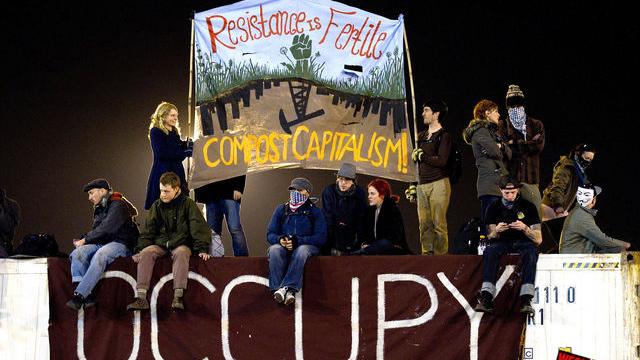
Talk of presumptive Vice Presidential nominee Paul Ryan's budget plan is all over the place. He's hailed as a strategist, deep-thinker, policy-wonk, and the intellectual heart of the Republican Party. He's their theorist.
What's in his [plan](http://budget.house.gov/fy2012budget/? Gutting Medicare and Medicaid? Deep cuts "for grants to state and local governments to support services that states and localities provide, such as education, law enforcement, water treatment facilities, and disaster response"? He'd cut taxes on the rich, raise them on the poor, and maintain or increase defense spending.
What will we see in 20 years - or sooner? The amplification of the worst trends already present in our society: the super-rich sheltered in their gates communities and high-rises, defended by the military (inclusive of a militarized police) and their own private security forces. Private education would continue to educate their children. Private health care would ensure their health and longevity.
What about the rest of us? We will be free. Free to fight among ourselves - completely armed - for the scraps that remain. We will compete for scholarships - ostensibly proving the continuation of merit and opportunity. We will compete for grants for art, design, and various other sorts of contracts. We will work ever harder for ever less as public schools, roads, hospitals, and infrastructure declines. And when we resist, when we organize - the defense budget Ryan has secured will fund the drone warfare and surveillance used against us. Private prisons will provide housing.
So, where's our plan? They know what they want: a security state that protects the rich from the poor, that protects enrichment on the backs of the poor. What do we want? The collective determination and steering of what is common for the common good.
What would this look like? In a nutshell, we can designate a handful of commons:
Planetary: air, water, land
Cultural: education, arts, science
Health: food, medicine, reproduction and child-rearing, aging and death
Preconditions: transportation, housing, energy, organization
These intersect and overlap (not just with each other but also temporally and spatially). Managing them together, as a collective and for the common interest, would require different ways of thinking about work, right, and need than people are currently accustomed to. For starters, this way of thinking is incompatible with private property. It's incompatible with the prioritization of business or profit. It begins from the supposition that people already shape the world in which we live, but that this shaping is now determined by capital and not by the people for their common good.
How do we get here? What's the strategy? Another way of asking this question: how do we put the incredible energy around tactics together with a plan for bringing about a fundamentally different political order, recognizing that this will not happen over-night and that the forces of the state and capital are allied against us?
First, we have to build ourselves into a stronger collective force. I'll use the term 'party' to designate this force (I think this is stronger than movement because it requires a greater degree of commitment), but 'front,' 'alliance,' and 'coalition' could also work. We need this kind of force because we need to have a way to encourage one another--Badiou talks about the party as a form for courage in Theory of the Subject. We also need it to provide a sense of what we are committed to (the 'line') even as we have to be able to change (evolve, revise, update) when necessary. The party will give us a sense of a big, growing, we that shares a commitment to building what is not an alternative but absolutely necessary. We have to stop treating ourselves as fragmented and recognize, affirm, consolidate, and extend our commonality.
Second, we have to infiltrate. We can't neglect the current political system - look at what the Tea Party has accomplished in less than four years: they dominate the Republican Party and are seen as providing it with its core principles. We have to infiltrate the Democratic Party at multiple levels, at each level emphasizing the commons and working to tax the rich, benefit the poor, and undermine property and finance. Connected with this infilitration is the need to change election laws to allow more third party candidates in every state as well as to work on constitutional amendments that will move toward a parliamentary system. The risk with this infiltration strategy is that the infiltrators might sell out, might compromise, might end up accomodating themselves to the capitalist system. That's why step one is essential.
Third, we have to co-opt every organization we can. This means replacing the fear of cooptation with a commitment to being the ones who take over and seize. It also means eliminating in ourselves a sense of 'fairness' or 'impartiality' that makes us think that we have to give the 'other side' anything at all. They are the enemy - we can never forget this (again, this is why step one is essential).
Fourth, we have to generate projects that build support and consciousness among poor, working, proletarianized, and discarded people and communities. Debt relief, free people's universities, common places - all these are opportunities for outreach. We have to use them so as to create a common climate for the commons. Silvia Federici and others talk about practices of communing - these are crucial here. Equally crucial is seeing them not as ends in themselves but as components of a larger strategy.
Fifth, we have to support, train, and protect comrades working alongside and outside legal channels. Their work is crucial. When it is well-targeted and well-timed, it is even necessary. Without one through four, though, it is counter-productive.
3 WAYS TO SHOW YOUR SUPPORT
- Log in to post comments











